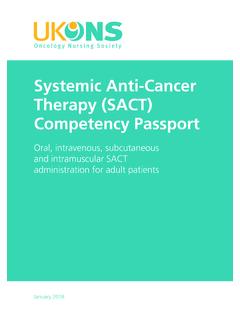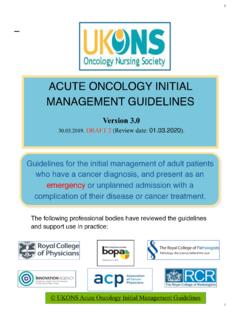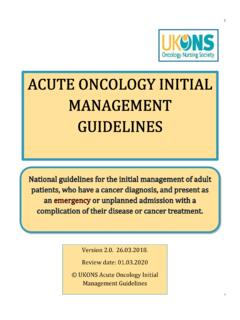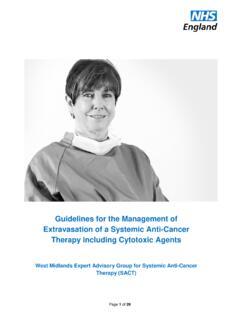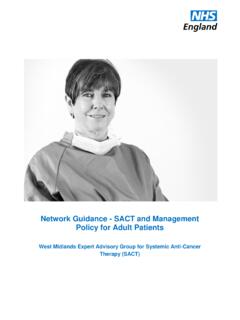Transcription of Systemic Anti-Cancer Therapy (SACT) Competency Passport
1 Systemic Anti-Cancer Therapy (SACT) Competency Passport Oral, intravenous, subcutaneous and intramuscular SACT administration for adult patientsV4. August 2019 Version 1 Developed by The Wales cancer Network Rosie Roberts, Velindre cancer Centre and Wales cancer Network Kerie Morris, South West Wales cancer Centre Version 2 and 3 Developed by Dr Catherine Oakley, Guy s and St Thomas NHS Foundation Trust and UKONS Ruth Hammond, The Royal Marsden NHS Foundation Trust and cancer Lead, CapitalNurse Version 4 Developed by Dr Catherine Oakley Rebecca JohlContributors Wendy Anderson, South Tees NHS Foundation Trust and UKONS Mary Tanay, King s College London Alison Hill, University College London Hospitals NHS Foundation Trust Rebecca Johl, Imperial College Healthcare NHS Trust Shirley Carey, University College London Hospitals NHS Foundation Trust Karen Phillips.
2 Barking, Havering and Redbridge University Hospitals NHS Trust (formerly Whittington Health NHS Trust) Rosie Roberts, Velindre cancer Centre and Wales cancer Network Dr Verna Lavender, Guy s and St Thomas NHS Foundation Trust and UKONS Dr Elaine Lennan, University Hospital Southampton NHS Foundation Trust Natalie Holbery, Clinical Lead, CapitalNurse Jane Fish, Project Manager Retention Workstream, CapitalNurse Lorraine Hyde, The Royal Marsden NHS Foundation Trust Lisa Barrott, Chemotherapy Nurse Consultant, The Royal Marsden NHS Foundation TrustEdited by Dr Lisa Dougherty, Independent Nurse ConsultantAcknowledgements Claire Paxman, Director of Sales and Training, Paxman Scalp Cooling Ltd Carol Pitches, Service User (Patient)
3 Melanie Dalby, Pharmacist, Guy s and St Thomas NHS Foundation Trust Mark Evans, Pharmacist, The Royal Marsden NHS Foundation TrustAcknowledgements: Pilot Sites Barts Health NHS Trust, Laura Applegate Guy s and St Thomas NHS Foundation Trust, Lucy Johnston Imperial College Healthcare NHS Trust, Rebecca Johl King s College Hospital NHS Foundation Trust, Kevin Saltmarsh The Royal Marsden NHS Foundation Trust, Ruth Hammond University College London Hospitals NHS Foundation Trust, Shirley Carey London North West Healthcare NHS Trust, Lesley Ashton Lewisham and Greenwich NHS Trust, Julie BakerPublication date: August 2019 Review date: August 2021 This document was developed from the All Wales Clinical Competencies for the Safe Handling and Administration of cytotoxic Chemotherapy.
4 This version was initiated by the London Lead cancer Nurses and led by Dr Catherine Oakley on behalf of the Pan London SACT Nurses Group and UKONS. The document has been sponsored by CapitalNurse and is owned by UKONS .3 Systemic Anti-Cancer Therapy (SACT) Competency PassportThe UK Oncology Nursing Society (UKONS) are delighted to publish this updated version (Version 4) of the Systemic Anti-Cancer Therapy (SACT) Competency Passport . We believe that it provides comprehensive standards for assessing SACT competence, which can be used throughout the UK. Production of Version 4 of the Passport was undertaken by the UKONS SACT Competency Passport Steering Group. This third version of the Passport both responds to, and includes, feedback from our members who have used the UKONS SACT Competence Passport Version 3 to assess the SACT competence of their staff to date.
5 The overall structure and key content of the Passport is unchanged, although the order, wording and formatting of some exercises has changed. The changes made aim to build on threshold concepts about SACT, improve the consistency, and reflect the treatment experience of a patient receiving SACT. The document has also been carefully reviewed to remove any duplication and increase clarity about the knowledge that is being assessed in the theory section. The revisions made to the style and formatting of some exercises in the theory section of Version 4 of the Passport , should also reduce the time taken for both a clinician to complete it and assessor to assess the theory section, without losing vital knowledge content. Version 4 of the Passport maintains its focus on patient-centred care, in recognition of this fundamental competent of high-quality SACT care.
6 I commend this version of the Passport , together with other UKONS SACT Competency documents, to SACT clinicians, managers, educators, trainers, assessors and commissioners, as a standardised resource to ensure high-quality care for people receiving SACT and their Verna Lavender UKONS President ElectAugust 2019 Foreword4 August Introduction .. Scope .. Glossary of terms .. Pre-requisite competencies .. Pre-requisite theoretical learning .. Professional responsibility .. Assessment process .. Sections to be completed ..9 Figure 1. SACT administration training pathway .. Step One: Theoretical Assessment Section (The Passport ) .. Safe handling and Safe handling .. Safe administration / fitness to treat.
7 Patient education, preparation, and self-care .. SACT spillages .. Oncology emergencies .. Administering oral SACT .. Administering intramuscular (IM) or subcutaneous (S/C) SACT .. Intravenous SACT .. Administering intravenous SACT .. Infiltration and extravasation (oncology emergency) .. Hypersensitivity/anaphylaxis .. Hair loss/scalp cooling (optional questions/role specific) .. Regimen exercise: Commencement of theory to practice .. Reflective account .. Theoretical assessment signature page .. Step Two: Clinical Practice Assessment Section .. All clinicians/all routes .. Route specific oral SACT .. Route specific intramuscular (IM) or subcutaneous (S/C) SACT .. Route specific intravenous (IV) SACT.
8 Pre-treatment consultation all routes .. Pre-treatment consultation additonal elements for oral SACT .. Clinical Practice Assessment Section: Signature pages and Competency certificate .. Safe handling and administration .. Administering oral SACT .. Administering intramuscular (IM) or subcutaneous (S/C) SACT .. Administering intravenous SACT .. Pre-treatment Consultation: All Routes .. Pre-treatment Consultation: Additional elements for oral SACT .. SACT safe handling and administration certificate ..694 Step Three: Re-accreditation Competency Certificate ..705 References ..726 Appendices ..78 Appendix 1: Guidance for Competency assessors ..78 Appendix 2: Theoretical objectives for Step One.
9 80 Appendix 3: Assessor Competency certificate ..827 Disclaimer ..83 Contents5 Systemic Anti-Cancer Therapy (SACT) Competency IntroductionWelcome to the UK Oncology Nursing Society (UKONS) Systemic Anti-Cancer Therapy (SACT) Competency Passport Version 4. Evaluation and review of Version 3 of the Passport has been conducted by the UKONS SACT Competency Passport Steering Group. This document provides an update of the Competency and assessment framework for the administration of oral, intramuscular, subcutaneous and intravenous SACT for adult patients. This Passport should be used alongside the UKONS SACT Competency Learning Outcomes Framework, which was published by the UKONS SACT Competency Passport Steering Group (Lavender and Oakley, 2019).
10 With the support of CapitalNurse and North London Partners in Health and Care, the group has worked with the Electronic Staff Record (ESR) Specialist Interest Group to gain approval for the UKONS SACT Competency Passport and Learning Outcomes Framework to be adopted as a suite of national SACT competencies, available to all NHS organisations. This means that for staff who work in the NHS, completion of the Passport can be recorded on to ESR. For staff working in the independent sector completion of the Passport can be recorded on the individual company s national education, training and development portals. In so doing, these competencies provide a nationwide, digitally-portable record of achievement of SACT competence.
